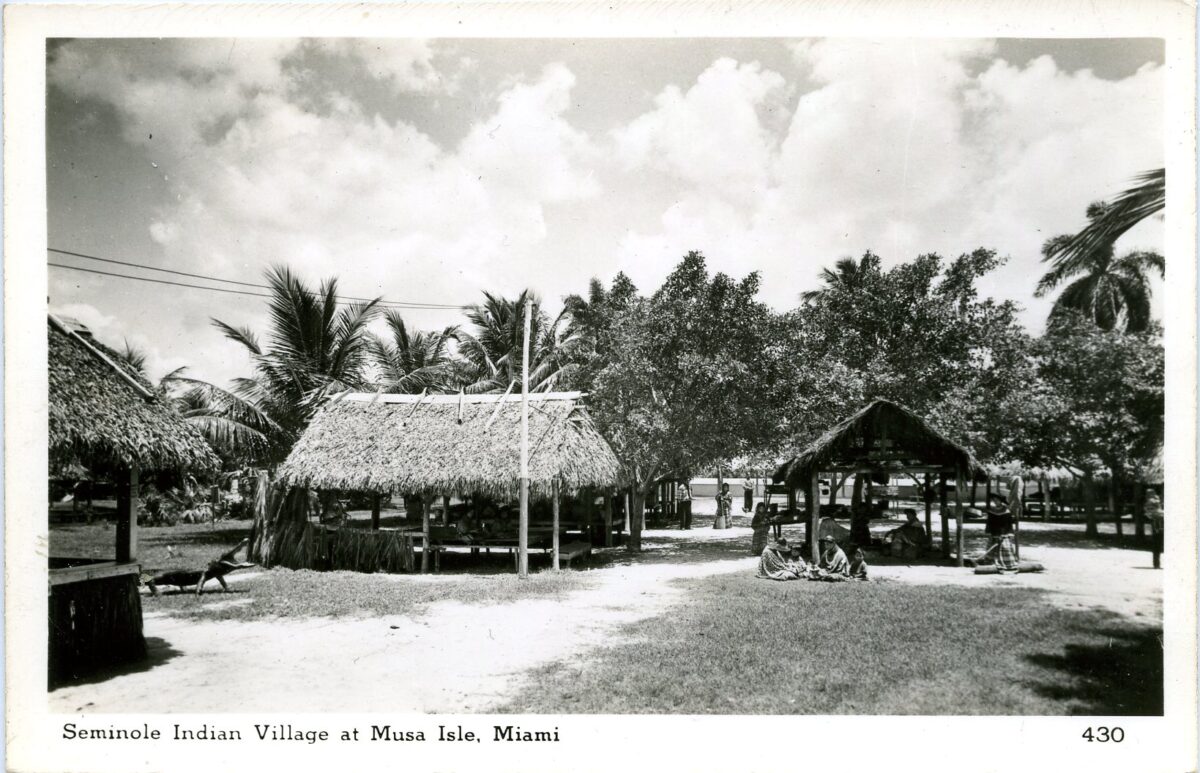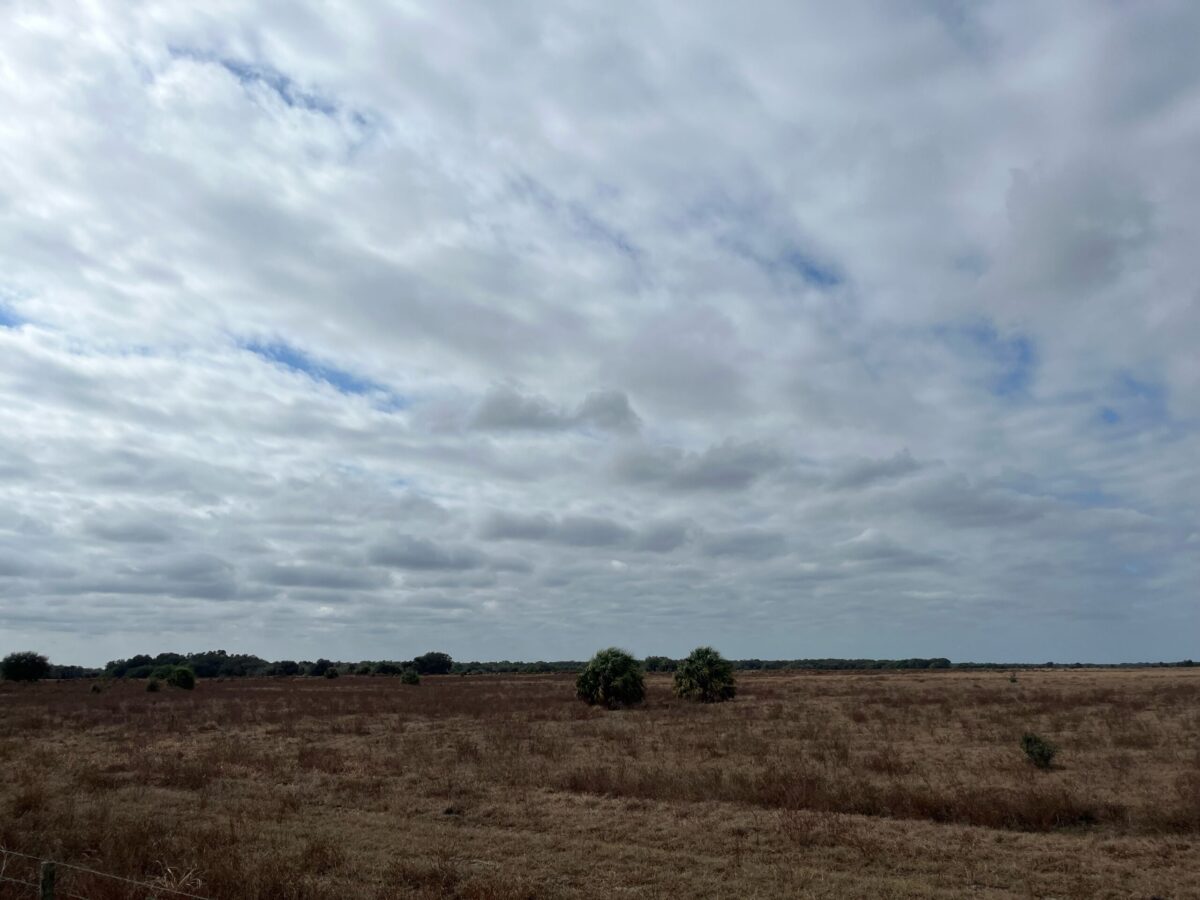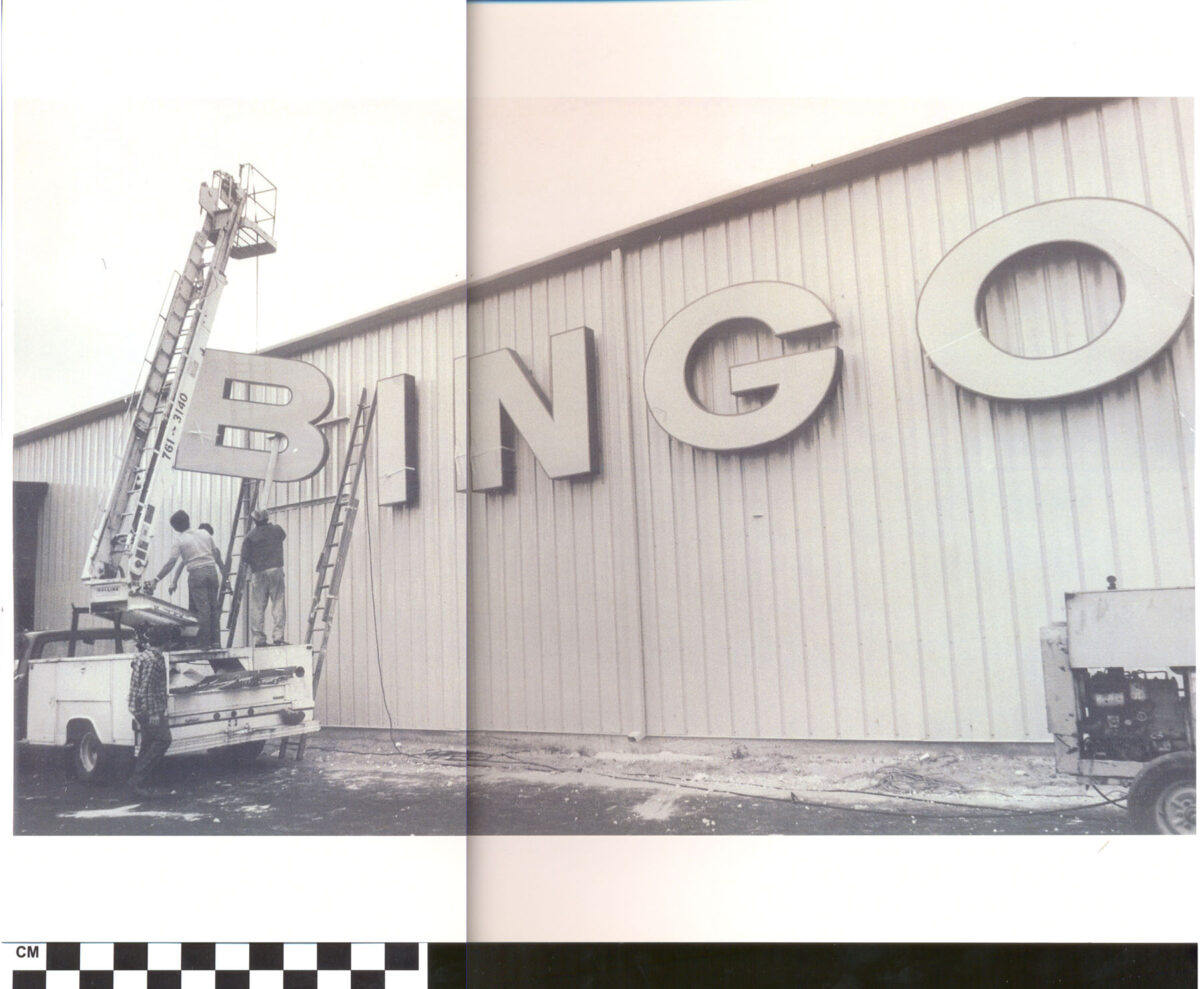
Betting Big on Bingo in the 1970s
Welcome back to the latest installment in our series Decades of Seminole Tourism! In this series, we have explored everything from alligator wrestling, exhibition shows, and tourist camps, to federal recognition. This week, join us in the groovy 1970s, for a peek into the businesses that paved the way for the Seminole Tribe of Florida as an international business powerhouse: smoke shops and bingo.
Below, you can see an aerial view of a smoke shop prior to bingo hall construction, 1979. If you look closely, you can read the sign, “Cigarettes – $5.00.”
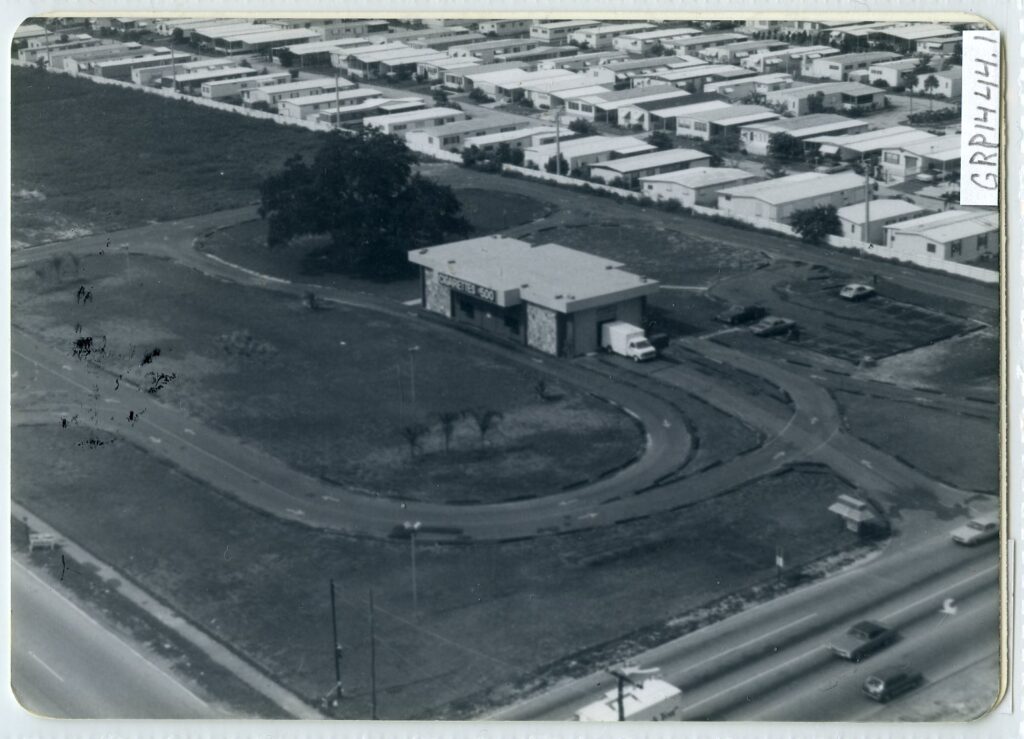
GRP1444.1, ATTK Museum
Smoke Shops
The Seminole Tribe of Florida opened its first tax-free, discount smoke shop in 1977. While they may seem simple, these smoke shops had a big impact on the future of the Tribe. Under Former Chairman Howard Tommie, these smoke shops were the first major business upholding tribal sovereignty. In an article for the Miami Herald in 1977, Tommie addressed criticisms that the Tribe shouldn’t operate tax free. Tommie said “We feel we have a right to do this…The thing people don’t know is that these politicians never put any tax dollars back on the reservation. We paid taxes for so many years, but money never came back on the reservation. This is a high cost area, we have a tribal government to run, and we have to survive” (Miami Herald, 12 August 1977).
Smoke shops, like the one opened in 1977 in Hollywood, became another brick shoring up the Seminole Tribe of Florida’s sovereign rights. Through these shops, and the bingo hall outlined below, “the long-impoverished Seminole Tribe began to flex their muscles as a sovereign nation” (West 232).
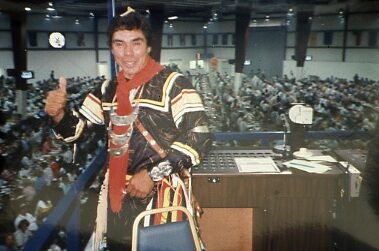
GRP1911.26, ATTK Museum
The Seminole Classic Bingo Hall
At the end of the 1970s, the Seminole Tribe of Florida would take their first step into gaming. Eventually, this would lead to the international powerhouse that is the Seminole Tribe of Florida’s Hard Rock Casinos. But, in the beginning it was simpler: bingo. In our featured image this week, you can see the giant “B” in “BINGO” being fastened to the side of the Hollywood Seminole Classic Bingo Hall in 1979. The Seminole Classic Bingo Hall was the country’s first large-scale bingo hall. It was located in Hollywood, in an unassuming metal building that is a far cry from the expanded Seminole Classic Casino of today. Despite its outward appearance, the bingo hall was an immediate success. The Tribe had considered leaning into bingo before. Former Chairman Howard Tommie had considered pursuing the new venture, but left office before implementing it.
But, it would be Chairman James E. Billie who would take the risk. Above, you can see then-Chairman Billie in traditional clothing, standing in a booth above the bingo hall in 1979. The bingo hall is full of people. Before the bingo hall even opened, Broward County Sherriff Robert Butterworth expressed his displeasure with the venture and telegraphed his intention to shut it down.
The bingo hall was approved in December 1979, with a U.S. District Court Judge placing “a temporary injunction preventing Butterworth from enforcing local and state laws that allow only non-profit organizations to run bingo games. The laws allow bingo two nights a week, with prizes of no more than $100 a game” (Palm Beach Post, 15 Dec 1979). The proposed high-stakes Seminole bingo hall blew past these restrictions, with no intention of adhering to these rules.
The Seminole Tribe Makes History
In a Seminole Tribune article from 2013, James E. Billie emphasized that even opening the bingo hall was a big risk, stating “Our attorneys gave us advice that we couldn’t open, but we tried anyway. We opened in December 1979 and didn’t know if we would survive. If we didn’t, we planned to make the building a skating rink.” Despite Florida law restricting bingo halls to being non-profit entities and capped their jackpots for $100, the Tribe’s bingo hall operated up to seven days a week with high-stakes jackpots. “There were laws in place at that time and we didn’t know if we could stay,” James E. Billie said, “So we put the least amount of money into the metal building and started bingo, which generated more income than the casinos in Las Vegas and Atlantic City.”
The Seminole Tribe of Florida became the first federally recognized tribe to operate a bingo hall on a reservation. But, almost immediately upon opening, Sherriff Butterworth threatened to shut it down, citing the operation as criminal. What followed was a fierce legal battle. The Seminole Tribe of Florida sued the state, and claimed their sovereign rights protected them from legal interference. After years of court battles, the United States Court of Appeals for the Fifth Circuit ruled in favor of the Seminole Tribe of Florida in Seminole Tribe of Florida v. Butterworth, upholding their sovereign rights on reservation land. This ruling would open the door and set the precedent for Indian gaming throughout the United States. Subsequently, it would reach far beyond the Seminole Tribe of Florida.
Below, you can see people inside the Seminole Classic Bingo Hall when it opened in 1979.
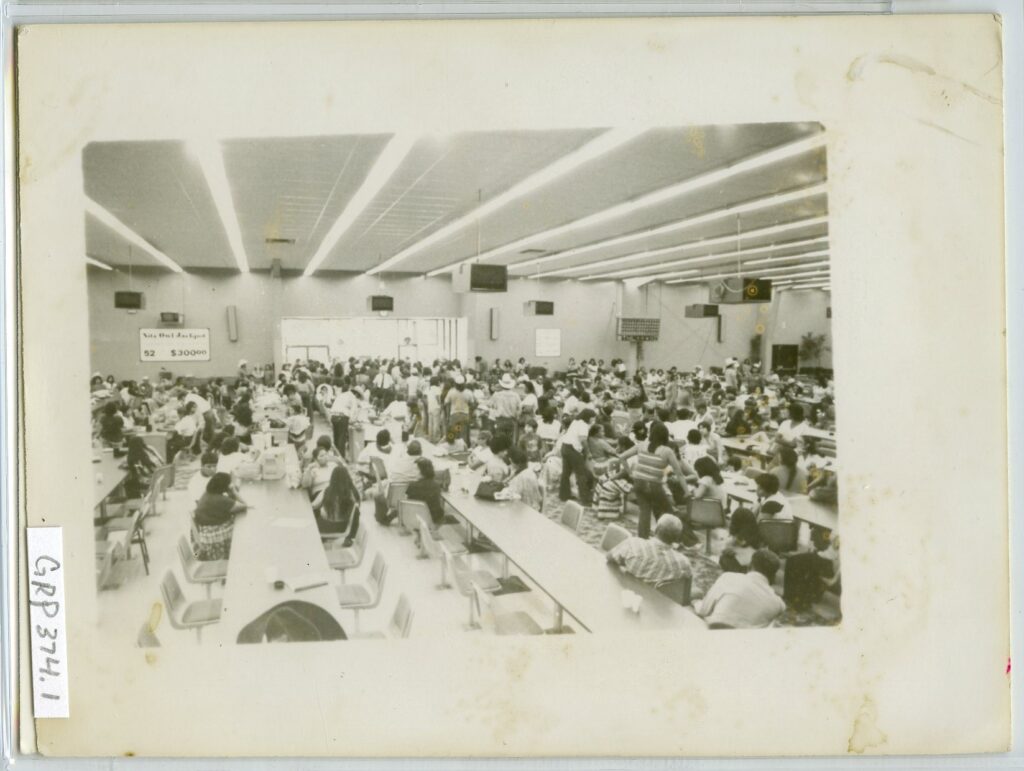
GRP374.1, ATTK Museum
Beyond the Bingo Hall
The impacts of those first, major businesses extend beyond the walls of the bingo hall. In 2013, the Seminole Classic (now, Casino) completed a $10-million dollar renovation. But, the impact of the original Seminole Classic Bingo Hall was at the forefront of the grand opening of those renovations. “I saw this building in 1979, and who would have thought it would be an empire?” then-Big Cypress Councilman Mondo Tiger said. “Hollywood Classic has been a winner since it opened.” Hollywood Board Representative Chris Osceola, who had worked at the casino for over twenty years, emphasized the importance. He stated “This place should be a monument; it all started right here. Indian gaming has had an impact on all Tribes. I’m proud it started with my Tribe.”
From the moment it opened its doors in 1979, the bingo hall was a resounding success. With it, and other enterprises like the smoke shops, the Seminole Tribe of Florida was able to reinvest in a number of education, health, recreation, and other social services. It represents much more than just a simple metal bingo hall. Furthermore, it is a symbol of resounding success for tribal sovereignty. In 2019, the Seminole Classic celebrated its 40th anniversary and commemorated the impact on the Seminole Tribe of Florida.
In a Seminole Tribune article on the anniversary, General Manager and Tribal Member Edward Aguilar spoke on the importance of this simple bingo hall, and its lasting impact. “(Gaming) funds cultural programs and social service programs so the younger generations of today don’t have to grow up in the poverty that their parents did,” Aguilar said. “It’s easy to forget the place in history that this place has. It really changed everything.”
Former Chairman James E. Billie
James E. Billie was the Tribal Council Chairman of the Seminole Tribe of Florida from 1979 through 2001, then again from 2011 through 2016. Born in Dania, Billie is a member of the Bird Clan. Billie has had a significant impact on the financial trajectory of the Tribe. Notably, ensuring the Tribe’s economic independence through business ventures such as the smoke shops, bingo halls, casinos, and hotels, as well as being a “consistent advocate for tribal tourism” (West 234). Additionally, Billie dedicated his tenure as Chairman to preserving traditional Seminole culture and language, strengthening the educational system, modernizing The Seminole Tribune, adding to tribal land, and even founding the Seminole Police Department (SPD).
In addition to his work for the betterment of the Seminole Tribe, he is an accomplished chickee builder, alligator wrestler, and award-winning musician. You can learn more about James E. Billie in a previous blog post. He received the Florida Folk Heritage Award in 2019.
Additional Sources
The author accessed these sources digitally. Page reference numbers may not align with paper and hardback copies.
West, Patsy. The Enduring Seminoles: From Alligator Wresting to Casino Gaming, Revised and Expanded Edition. 2008. University Press of Florida. Digital.
Author Bio
Originally from Washington state, Deanna Butler received her BA in Archaeological Sciences from the University of Washington in 2014. Deanna moved to South Florida in 2016. Soon, she began working for the Seminole Tribe of Florida’s Tribal Historic Preservation Office. Deanna was the THPO’s Archaeological Collections Assistant from 2017-2021. While at the THPO, Deanna worked to preserve, support, and process the Tribe’s archaeological collection. She often wrote the popular Artifact of the Month series, and worked on many community and educational outreach programs. She lives in Fort Myers, FL with her husband, son, and dog.


